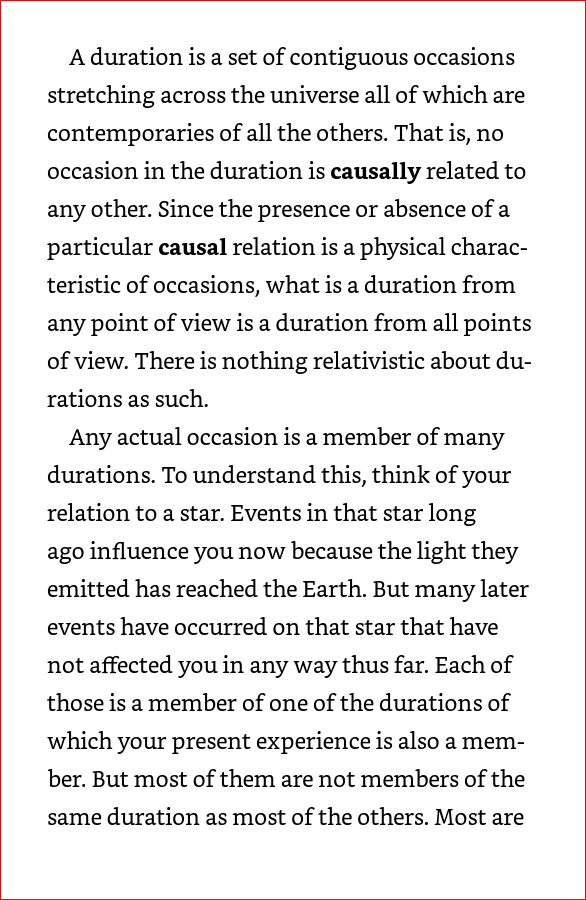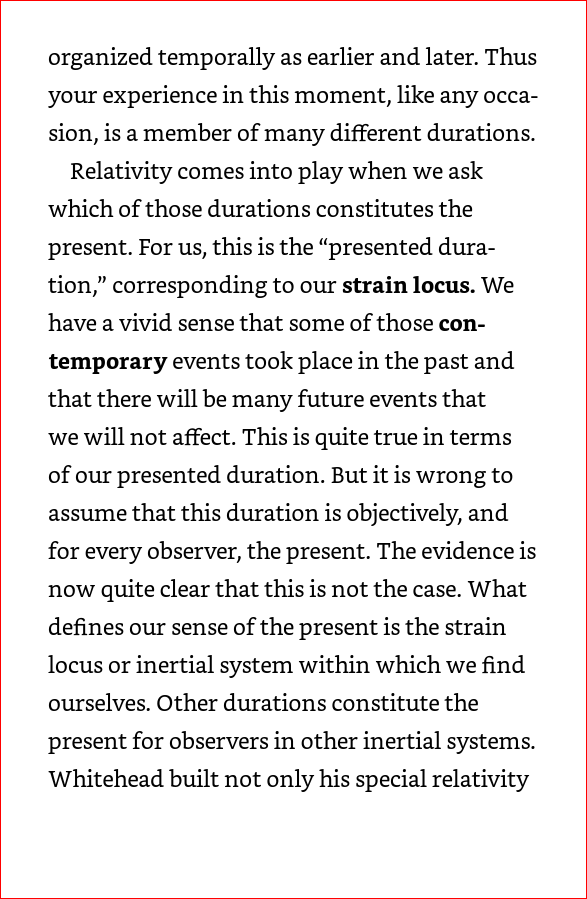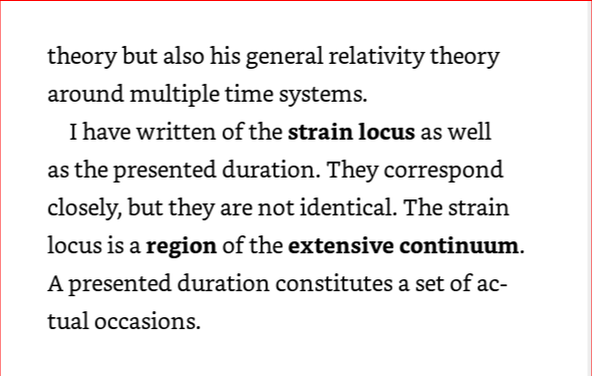- Home
- Process Worldview
- Community
- Art and Music
- Whitehead and Process Thinking
- Podcasts
- Spirituality
- Ecological Civilization
- Education
- Contact
- Social Justice
- Science
- Animals
- Sacred Poems
- Whitehead Videos
- Index of All Titles
- Practicing Process Thought
- Process Spirituality: A Spiritual Alphabet
- Recent Posts
Feeling the Feelings of Contemporaries?
Can we feel the feelings of contemporaries? Other people, for example. Whitehead says no. We may be able to feel their locations, but we cannot feel their feelings.
Whitehead uses the phrase "unison of becoming" to name the fact that entities can happen together (contemporary to one another) even as they do not exactly happen at the same time, because there is no same time. Their happening in unison leave rooms for their respective self-creativity and thus, in this respect, their causal independence. They are in their own temporal frames of reference or time systems, as defined by where they are in the space-time continuum. Amid this unison of becoming, they do not actually "feel" or prehend one another. Rather they feel or prehend their past actual worlds. The upshot of this is that, when two people are talking, they are not exactly present to one another; rather they are past to one another.
Many people find Whitehead's idea of the causal independence of contemparies understandable but unsatisfying. It contradicts the intuition that, in fact, other people and the world are present to us in a direct way. We feel their feelings in a now that is connected to their now.
Whitehead says that this does not happen in what he calls "presentational immediacy." It is, for him, merely sensory unless connected with causal influences from the past which do in fact carry the feelings of others, in what he calls "symbolic reference." Whitehead does not allow for a feeling of their present feelings.
There are perhaps two ideas that can help honor the intuition of such connections; Whitehead's notion of strain feelings which do seem to feel the presence, if not of other actualities, then as least of other regions in the contempoary world. See What are Strain Feelings? The other is hybrid physical prehensions, which feel the presence of the mental poles of other actualities without necessary mediation by space-time contiguities. A Whiteheadian perspective may be developed in which we can, in fact, feel the feelings of contempories amid our unison of becoming, even as we are also free in the present. The purpose of the remainder of this page is to give you a sense of Whitehead's perspective on his own terms.
- Jay McDaniel, Dec. 19, 2021
Whitehead uses the phrase "unison of becoming" to name the fact that entities can happen together (contemporary to one another) even as they do not exactly happen at the same time, because there is no same time. Their happening in unison leave rooms for their respective self-creativity and thus, in this respect, their causal independence. They are in their own temporal frames of reference or time systems, as defined by where they are in the space-time continuum. Amid this unison of becoming, they do not actually "feel" or prehend one another. Rather they feel or prehend their past actual worlds. The upshot of this is that, when two people are talking, they are not exactly present to one another; rather they are past to one another.
Many people find Whitehead's idea of the causal independence of contemparies understandable but unsatisfying. It contradicts the intuition that, in fact, other people and the world are present to us in a direct way. We feel their feelings in a now that is connected to their now.
Whitehead says that this does not happen in what he calls "presentational immediacy." It is, for him, merely sensory unless connected with causal influences from the past which do in fact carry the feelings of others, in what he calls "symbolic reference." Whitehead does not allow for a feeling of their present feelings.
There are perhaps two ideas that can help honor the intuition of such connections; Whitehead's notion of strain feelings which do seem to feel the presence, if not of other actualities, then as least of other regions in the contempoary world. See What are Strain Feelings? The other is hybrid physical prehensions, which feel the presence of the mental poles of other actualities without necessary mediation by space-time contiguities. A Whiteheadian perspective may be developed in which we can, in fact, feel the feelings of contempories amid our unison of becoming, even as we are also free in the present. The purpose of the remainder of this page is to give you a sense of Whitehead's perspective on his own terms.
- Jay McDaniel, Dec. 19, 2021
The Unison of Becoming and
the Causal Independence of Contemporaries
A conception of time is fundamental to Whitehead’s metaphysics in Process and Reality. The creative advance of actual occasions is inherently temporal. Each actual occasion is a temporally novel act of becoming. When it comes into being, it feels only those actual occasions that have already come into being, i.e., those that are in its "causal past." It does not feel those actual occasions that are in "unison of becoming" with it, i.e., those that are its causal "contemporaries." And those actual occasions that will when they come into being feel it are in its "causal future" (123-26). In short, the creative advance of actual occasions is temporally ordered.
*
According to the theory of relativity, simultaneity is relative (to the observer or the frame of reference). There is no absolute present. And so time does not involve such uniquely serial instants.
Adopting this relativity view of time, Whitehead maintained that the temporal order of actual occasions is not uniquely serial. More explicitly; the formal properties of the relation earlier that holds among actual occasions are these: it is irreflexive, asymmetric, and transitive; but it is not connected. For some actual occasions are contemporaries, i.e., some are in unison of becoming. Suppose that actual occasion A and actual occasion D are contemporaries. A is in unison of becoming with D. In other words, when A comes into being, D has not already come into being; and, when D comes into being, A has not already come into being. That is, A does not come into being before D comes into being, nor does D come into being before A comes into being. A’s act of becoming is neither earlier nor later than D’s act of becoming. The order of becoming is not uniquely serial.
Furthermore, he claimed in Process and Reality that, even though there is no absolute present, there are "durations." A "duration is a cross-section of the universe" (125). Each actual occasion "lies in many durations" (125). It does not lie in a cross-section of the universe that is unique. The temporal order of durations is not uniquely serial. Instead of instants in a serial order, there are durations in a strict partial order.
- John Lango, excerpt from The Time of Whitehead's Concrescence
John W. Lango is Associate Professor of Philosophy, Department of Philosophy, Hunter College of the City University of New York, 695 Park Avenue, New York, NY 10021. He is the author of Whitehead’s Ontology and various articles on metaphysics and ethics. E-mail [email protected]. The Time of Whitehead's Concrescence appeared in Process Studies, pp. 3-21, Vol. 30, Number 1, Spring-Summer, 2001. Process Studies is published quarterly by the Center for Process Studies, 1325 N. College Ave., Claremont, CA 91711. Used by permission. This material was prepared for Religion Online by Ted and Winnie Brock; the excerpt is reposted with permissions.
*
According to the theory of relativity, simultaneity is relative (to the observer or the frame of reference). There is no absolute present. And so time does not involve such uniquely serial instants.
Adopting this relativity view of time, Whitehead maintained that the temporal order of actual occasions is not uniquely serial. More explicitly; the formal properties of the relation earlier that holds among actual occasions are these: it is irreflexive, asymmetric, and transitive; but it is not connected. For some actual occasions are contemporaries, i.e., some are in unison of becoming. Suppose that actual occasion A and actual occasion D are contemporaries. A is in unison of becoming with D. In other words, when A comes into being, D has not already come into being; and, when D comes into being, A has not already come into being. That is, A does not come into being before D comes into being, nor does D come into being before A comes into being. A’s act of becoming is neither earlier nor later than D’s act of becoming. The order of becoming is not uniquely serial.
Furthermore, he claimed in Process and Reality that, even though there is no absolute present, there are "durations." A "duration is a cross-section of the universe" (125). Each actual occasion "lies in many durations" (125). It does not lie in a cross-section of the universe that is unique. The temporal order of durations is not uniquely serial. Instead of instants in a serial order, there are durations in a strict partial order.
- John Lango, excerpt from The Time of Whitehead's Concrescence
John W. Lango is Associate Professor of Philosophy, Department of Philosophy, Hunter College of the City University of New York, 695 Park Avenue, New York, NY 10021. He is the author of Whitehead’s Ontology and various articles on metaphysics and ethics. E-mail [email protected]. The Time of Whitehead's Concrescence appeared in Process Studies, pp. 3-21, Vol. 30, Number 1, Spring-Summer, 2001. Process Studies is published quarterly by the Center for Process Studies, 1325 N. College Ave., Claremont, CA 91711. Used by permission. This material was prepared for Religion Online by Ted and Winnie Brock; the excerpt is reposted with permissions.
Whitehead's Idea of Concrescence
John Cobb on Concrescence
Concrescence is simply the process of becoming “concrete.” Concrete means fully actual, and that means a completed actual occasion. The use of the term “concrescence” places emphasis on the idea that even these momentary flashes of actuality that Whitehead calls actual occasions are processes. There is the actual occasion in the process of becoming, and then there is the completed occasion. Whitehead calls the completion “satisfaction.” This term emphasizes that this process of becoming is characterized by subjectivity. There is a subjective aim, a subjective form, a decision, and a satisfaction. But as soon as the occasion attains satisfaction it becomes an objective datum for successor occasions.
Ordinarily, to think of a process is to think of earlier and later segments of the process. Whitehead uses that language at times. But he warns us against interpreting this language or the concrescence itself in a temporal way. In an important sense, it all happens at once. Viewed externally, the occasion is either there as datum to be prehended or it is not. It is never partially there. Furthermore, everything that happens in the process of concrescence presupposes the unity that is its outcome. If we think in temporal terms, this does not make sense. One might say, nevertheless, that the process is “temporal” but not in the sense of clock time that functions in physics or in ordinary language. It would be a unique sort of temporality, which Whitehead calls microscopic subjective aim, a subjective form, a decision, and a satisfaction. But as soon as the occasion attains satisfaction it becomes an objective datum for successor occasions. Ordinarily, to think of a process is to think of earlier and later segments of the process. Whitehead uses that language at times. But he warns us against interpreting this language or the concrescence itself in a temporal way. In an important sense, it all happens at once. Viewed externally, the occasion is either there as datum to be prehended or it is not. It is never partially there. Furthermore, everything that happens in the process of concrescence presupposes the unity that is its outcome. If we think in temporal terms, this does not make sense. One might say, nevertheless, that the process is “temporal” but not in the sense of clock time that functions in physics or in ordinary language. It would be a unique sort of temporality, which Whitehead calls microscopic and responds to it. This can happen in a “split second.” She sees a car coming at her, she sees the location and movement of other cars, and she sees that there is just one way of braking and swerving that will avoid a collision. The situation and the reasoning that supports the decision are very complex. To explain why she acted as she did might take some time. But in fact the decision is almost instantaneous. The complex calculations involved include several stages. Some parts presuppose other parts. But they occur all at once. The point is that a complex process, analyzable into stages, can take place in a moment.
The process of concrescence is the self-creation of the occasion. It is the subject or recipient of the causal efficacy of the past and it is the subject that integrates and transforms what it receives. It takes what is given to it objectively and constitutes itself as a new subject. In the moment of its concrescence, the occasion enjoys its own experience. That does not mean that it prehends that experience. Whitehead uses the term “enjoy” to emphasize that this is not a datum for something else, but the reality of the occasion itself, in itself, and for itself. The term suggests that to be in this way is something positive. It does not exclude pain or suffering. The point is that in the concrescence there is “subjective immediacy.” We all know what subjective immediacy is. It is the way our experience feels to us at all times. But when we think of it, we almost necessarily have conscious subjective immediacy in mind. To understand Whitehead, we must grasp that there is also nonconscious subjective immediacy; indeed, that the vast majority of subjective immediacy is not conscious. We can begin by recognizing that much of the time we are not conscious of our own emotions. Others may see that we are embarrassed or angry, and we may deny it. Sometimes, of course, the denial may be a lie, but at other times it expresses ignorance. Psychologists may train us to pay attention to our emotions. The point is simply that the emotions are there in subjective immediacy whether we are aware of them or not.
Cobb Jr, John B. Whitehead Word Book: A Glossary with Alphabetical Index to Technical Terms in Process and Reality (Toward Ecological Civilization Book 8) . Process Century Press. Kindle Edition.
Ordinarily, to think of a process is to think of earlier and later segments of the process. Whitehead uses that language at times. But he warns us against interpreting this language or the concrescence itself in a temporal way. In an important sense, it all happens at once. Viewed externally, the occasion is either there as datum to be prehended or it is not. It is never partially there. Furthermore, everything that happens in the process of concrescence presupposes the unity that is its outcome. If we think in temporal terms, this does not make sense. One might say, nevertheless, that the process is “temporal” but not in the sense of clock time that functions in physics or in ordinary language. It would be a unique sort of temporality, which Whitehead calls microscopic subjective aim, a subjective form, a decision, and a satisfaction. But as soon as the occasion attains satisfaction it becomes an objective datum for successor occasions. Ordinarily, to think of a process is to think of earlier and later segments of the process. Whitehead uses that language at times. But he warns us against interpreting this language or the concrescence itself in a temporal way. In an important sense, it all happens at once. Viewed externally, the occasion is either there as datum to be prehended or it is not. It is never partially there. Furthermore, everything that happens in the process of concrescence presupposes the unity that is its outcome. If we think in temporal terms, this does not make sense. One might say, nevertheless, that the process is “temporal” but not in the sense of clock time that functions in physics or in ordinary language. It would be a unique sort of temporality, which Whitehead calls microscopic and responds to it. This can happen in a “split second.” She sees a car coming at her, she sees the location and movement of other cars, and she sees that there is just one way of braking and swerving that will avoid a collision. The situation and the reasoning that supports the decision are very complex. To explain why she acted as she did might take some time. But in fact the decision is almost instantaneous. The complex calculations involved include several stages. Some parts presuppose other parts. But they occur all at once. The point is that a complex process, analyzable into stages, can take place in a moment.
The process of concrescence is the self-creation of the occasion. It is the subject or recipient of the causal efficacy of the past and it is the subject that integrates and transforms what it receives. It takes what is given to it objectively and constitutes itself as a new subject. In the moment of its concrescence, the occasion enjoys its own experience. That does not mean that it prehends that experience. Whitehead uses the term “enjoy” to emphasize that this is not a datum for something else, but the reality of the occasion itself, in itself, and for itself. The term suggests that to be in this way is something positive. It does not exclude pain or suffering. The point is that in the concrescence there is “subjective immediacy.” We all know what subjective immediacy is. It is the way our experience feels to us at all times. But when we think of it, we almost necessarily have conscious subjective immediacy in mind. To understand Whitehead, we must grasp that there is also nonconscious subjective immediacy; indeed, that the vast majority of subjective immediacy is not conscious. We can begin by recognizing that much of the time we are not conscious of our own emotions. Others may see that we are embarrassed or angry, and we may deny it. Sometimes, of course, the denial may be a lie, but at other times it expresses ignorance. Psychologists may train us to pay attention to our emotions. The point is simply that the emotions are there in subjective immediacy whether we are aware of them or not.
Cobb Jr, John B. Whitehead Word Book: A Glossary with Alphabetical Index to Technical Terms in Process and Reality (Toward Ecological Civilization Book 8) . Process Century Press. Kindle Edition.




